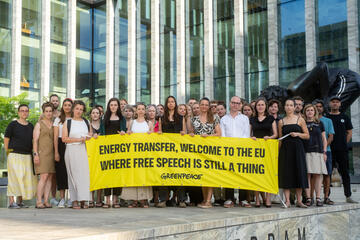
Activists from Greenpeace International and allies outside the courthouse in Amsterdam © Tengbeh Kamara / Greenpeace
2 July 2025, Amsterdam, Netherlands – In a first test case of Europe’s new legislation to protect freedom of expression and stop abusive lawsuits, Greenpeace International today challenges the US oil pipeline company Energy Transfer in court in the Netherlands. At the same time, 40 organisations across fifteen European countries are urging their respective governments to transpose the EU “anti-SLAPP” directive into national law.
The multi-billion dollar company Energy Transfer brought two back-to-back SLAPP suits against Greenpeace International and Greenpeace in the US after the peaceful Standing Rock protests in 2016 against the Dakota Access Pipeline. The first case was dismissed, but the Greenpeace organisations continue to defend against the second case, which is ongoing, after a North Dakota jury recently awarded over 660 million USD in damages to the pipeline giant, for showing solidarity with the Indigenous-led protest.
Activists from Greenpeace International and allies were present outside the courthouse in Amsterdam for the first procedural hearing in the case with a big banner reading “ENERGY TRANSFER, WELCOME TO the EU - WHERE FREE SPEECH IS STILL A THING”.
Mads Flarup Christensen, Executive director, Greenpeace International said:
“Abusive SLAPP suits are a direct threat to freedom of speech and the right to peaceful protest. But together we will defeat this unjust tactic. The case has the potential to turn the page on intimidation lawsuits and show that corporate bullying doesn’t work. Energy Transfer is trying to silence the real story: they are making billions while polluting our planet with oil and gas.”
More and more organisations, journalists, activists, human rights defenders, and members of communities across Europe are recognising SLAPPs as a threat to their freedom of speech as well as the public’s right to know. CASE (Coalition Against SLAPPs in Europe) has identified a total of 1,049 SLAPP cases brought in the period 2010-2023. EU member states have until 7 May 2026 to bring the directive into their national laws but so far little progress has been made. This is why over 40 organisations in more than fifteen countries have gathered today to push their respective governments in honoring the directive.
Charlie Holt, the European lead for Global Climate Legal Defense (CliDef) and part of the Steering Committee of CASE, said:
“Over a year has passed since the passage of the landmark Anti-SLAPP Directive and startlingly little progress has been made in making its protective measures a reality. Greenpeace International’s lawsuit in the Netherlands now presents Dutch courts with the first major test of the directive. In its preamble, the Directive emphasised that protection from SLAPPs filed outside of the EU was necessary to protect European democracy and safeguard human rights in the Union. If such protections cannot be invoked in a case as aggressive and transparently abusive as Energy Transfer’s, it’s hard to imagine a situation in which they would ever apply. Until we have clarity from the courts, however, European democracy will continue to remain exposed to attack by powerful private interests.”
EFJ, European Federation of Journalists, President Maja Sever:
"After years of negotiating legislation, it's time to see how the EU anti-SLAPP directive will be applied in practice and to test its effectiveness in protecting public participation. Today European journalists firmly stand with Greenpeace: against the abuse of power, for freedom of expression and the right to protest. This case concerns us all."
Participating organisations
Greenpeace International
CASE
Samen Sterk! vzw
Erfpacht vzw
Legally Green
Greenpeace Belgium
Greenpeace Bulgaria
Greenpeace Luxembourg
Greenpeace Spain
Greenpeace Romania
Bankwatch Romania
Greenpeace Sweden
Grad Recht
European Environmental Bureau
ClientEarth
The trade union of Journalists in Croatia
Za Zemiata
Bulgarian Biodiversity Foundation
BlueLink Bulgaria
Rettet den Regenwald (Rainforest Rescue)
European Federation of Journalists (EFJ)
Asociatia EcoLegal
Free Press Unlimited (FPU)
Index on Censorship
Global Climate Legal Defense
The Good Lobby Italy
The Daphne Caruana Galizia Foundation
Bulgarian Anti-SLAPP Working Group
Belgium Anti-SLAPP Working Group
Polish Anti-SLAPP Working Group
FIBGAR – Baltasar Garzon International Foundation
Foundation Atelier for Community Transformation ACT BiH
CeRe - The Resource Center for Public Participation
Oil Change International
Civic Initiatives
ARTICLE 19 Europe
Xnet - Institute for Democratic Digitalisation
Osservatorio Balcani Caucaso Transeuropa (OBCT)
Global Witness
FragDenStaat
Reporter ohne Grenzen
Center for Spatial Justice
FADA Collective
dju - German Union of Journalists
Fridays for Future Germany
Blueprint for Free Speech
No SLAPP Anlaufstelle Deutschland
Centar Za Životnu Sredinu
Aarhus Center
Solidarity Risining
This content is part of the Media Freedom Rapid Response (MFRR), a Europe-wide mechanism which tracks, monitors and responds to violations of press and media freedom in EU Member States and Candidate Countries. The project is co-funded by the European Commission.


